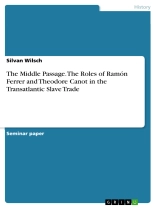Seminar paper from the year 2016 in the subject History of Europe — Middle Ages, Early Modern Age, grade: 2, 0, University of Freiburg, language: English, abstract: The transatlantic slave trade from the early fifteenth to the second half of the nineteenth century played a major role for the development of the modern world. It enabled Europe’s transition to capitalism, the nation-state, and imperialism, and fostered the growth of western European nations and empires. Slave ships were the most important link between Europe, Africa and America and enabled the development of the Americans. All this, as well as the creation of a higher standard of living for many Europeans and Americans, happened at the expense of millions of enslaved people and was connected to inconceivable suffering.
Talking about the transatlantic slave trade means talking about the biggest case of forced migration in recorded human history. Over the course of four centuries, slave ships continued to cross the Atlantic. It is estimated that between the years of 1500 and 1900 approximately 11, 7 million Africans were forcefully deported into slavery, mainly from West, Central and South Africa. A mere 9, 8 to 10 million of these abducted prisoners reached their intended destinations alive. The other 1, 7 million prisoners were not able to endure the torments of the transatlantic crossing — the middle passage -, or died shortly after their arrival as a result of the deprivations they suffered whilst on the slave ships.
Due to the immense importance of the middle passage for the slave trade between Africa and the Americans, this paper investigates the topic further. A transatlantic slave trade will serve as background for further analysis. The macrostructure of the slave trade will be examined using the example of the 18th century French slave ship ‘Diligent’. Concerning the microstructure, the historical records of Captain Theodore Canot and additional secondary literature will serve as the basis for an analysis of the conditions on slave ships at the time. In a final step, the life of Ramón Ferrer — captain of the slave ship ‘Amistad’ — will be reconstructed with the aid of newly released documents and by using the chronicles of Canot as a guideline to speculate about gaps in Ferrer’s biography.
Silvan Wilsch
The Middle Passage. The Roles of Ramón Ferrer and Theodore Canot in the Transatlantic Slave Trade [PDF ebook]
The Middle Passage. The Roles of Ramón Ferrer and Theodore Canot in the Transatlantic Slave Trade [PDF ebook]
Купите эту электронную книгу и получите еще одну БЕСПЛАТНО!
язык английский ● Формат PDF ● ISBN 9783668526624 ● Размер файла 0.7 MB ● издатель GRIN Publishing ● город München ● Страна DE ● опубликованный 2017 ● Издание 1 ● Загружаемые 24 месяцы ● валюта EUR ● Код товара 5246568 ● Защита от копирования без












